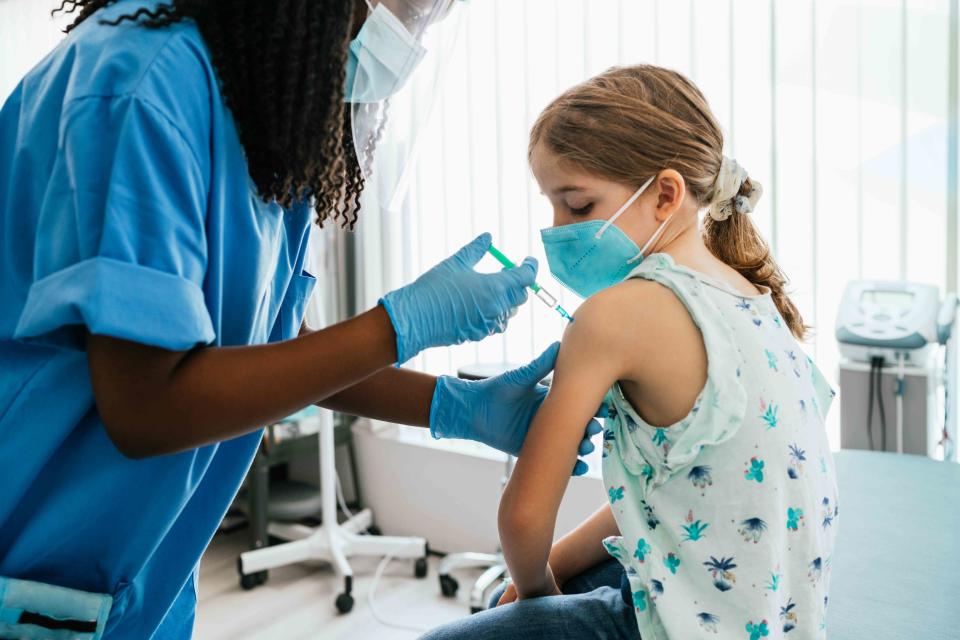CDC Committee Votes To Add COVID-19 Vaccine To Recommended Immunization Schedule
A panel of experts is advising the CDC to add the COVID-19 vaccine to the recommended vaccine schedule.

KoldoyChris/Getty Images
The Advisory Committee on Immunization Practices (ACIP) has unanimously voted to advise the Centers for Disease Control and Prevention (CDC) to add the COVID-19 vaccine to the current recommended immunization schedule for people of all ages. This recommendation includes children as young as 6 months. It is essential to clarify that this is only a recommended schedule of vaccines; it's not mandated and has not yet been accepted and adopted by the CDC.
Many parents are familiar with the vaccine schedule that includes immunizations against polio, measles, and other diseases. Adding the COVID-19 vaccines and boosters to the recommended lineup of vaccines to help the young and old stay healthy comes as no surprise as we head into another winter where experts expect to see a COVID-19 surge. The decision to add the COVID-19 vaccine to the CDC list of recommended vaccines will ultimately be decided by the CDC and not this advisory committee.
Related:Everything Parents Need to Know About the COVID-19 Vaccines
Will COVID-19 Vaccines Be Mandated by Schools?
Parents should note that the ACIP recommendation does not mean that the COVID-19 vaccine will be mandated for students before enrolling in public schools. Those types of mandates happen solely at the state and local levels. As NBC News pointed out, the CDC added the HPV vaccine to the immunization schedule; however, only a handful of states have required it for students who matriculate in public schools.
"Moving Covid-19 to the recommended immunization schedule does not impact what vaccines are required for school entrance, if any," Dr. Nirav Shah, director of the Maine Center for Disease Control and Prevention, said at the 2022 ACIP meeting. "Local control matters. And we honor that the decision around school entrance for vaccines rests where it did before, which is with the state level, the county level, and at the municipal level if it exists at all."
Why Is This COVID-19 Vaccine Recommendation Significant?
Should the CDC adopt this recommendation, any updated immunization schedule that includes the COVID-19 vaccine and boosters will help insurance providers that usually cover the cost of vaccines listed on the CDC-recommended vaccine schedule. This distinction is significant as the federal government is winding down and ending its publicly funded program to offer free COVID-19 vaccines to kids and adults.
Related:Vaccine Schedule for Babies and Toddlers: A Cheat Sheet for Parents
The ACIP also voted to include the COVID-19 vaccine in the Vaccines for Children program, a nationalized public health program that offers free vaccines to kids who are eligible for or covered by Medicaid. This addition will open the COVID-19 vaccine to uninsured or underinsured children.
Following a vaccination schedule can feel confusing, considering that there are vaccines for 25 different diseases. That said, not all of the vaccines listed by the CDC are required for kids to enroll in public school. Again, vaccine mandates happen at a state and local level, so check your state or local community to learn how they impact you and your family.
Related:Will the COVID-19 Vaccine Be Mandatory for Kids?
Should My Child Get the COVID-19 Vaccine?
Some parents worry that giving too many vaccines in a short window can overwhelm a child's natural immune system. However, current data does not support that claim. The American Academy of Pediatrics (AAP) notes that kids are constantly exposed to germs, called antigens, and in a typical day, might be fighting off between 2,000 and 6,000 antigens. The AAP also says that a child fights off under 150 antigens in the entire vaccine schedule combined. In short, kids' immune systems are not overwhelmed by vaccines, and it is safe to add the COVID-19 vaccine to the current recommended vaccine schedule.
The current CDC COVID-19 vaccine guidelines say that children as young as 6 months can receive the Pfizer-BioNTech or Moderna vaccines. They recommend that all children receive the vaccine even if they have already been infected with COVID-19. The CDC also recommends that people aged 5 years and older should get an updated (bivalent) booster as long as it has been 2 months since their last COVID-19 vaccine.
To learn more about up-to-date data on COVID-19, and the science and safety of vaccines, including the COVID-19 vaccine, visit the CDC website.
false

